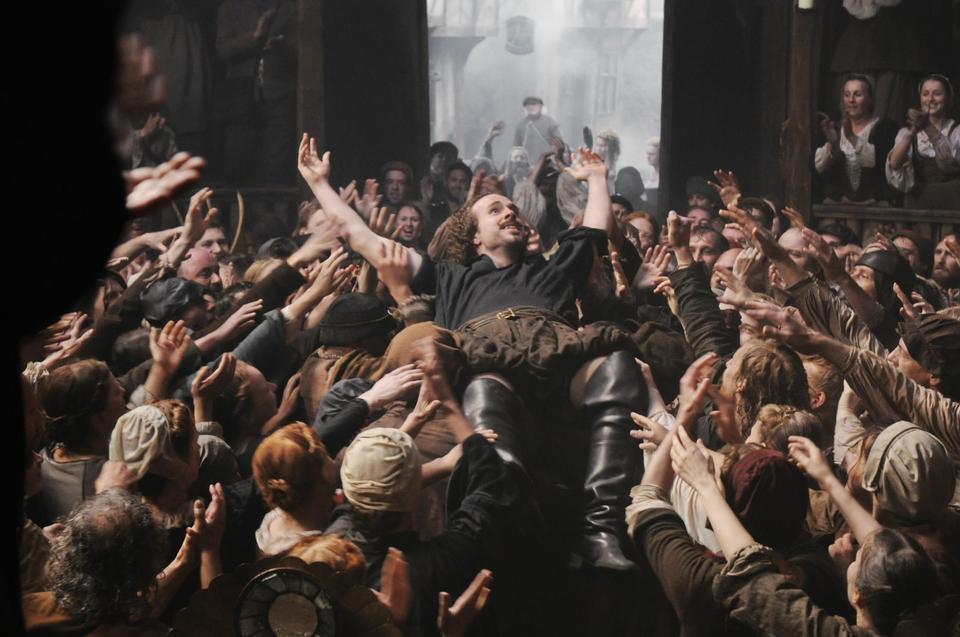
News
HMS Is Facing a Deficit. Under Trump, Some Fear It May Get Worse.

News
Cambridge Police Respond to Three Armed Robberies Over Holiday Weekend

News
What’s Next for Harvard’s Legacy of Slavery Initiative?

News
MassDOT Adds Unpopular Train Layover to Allston I-90 Project in Sudden Reversal

News
Denied Winter Campus Housing, International Students Scramble to Find Alternative Options
‘Anonymous’ is an Overdone Spectacle
Anonymous -- Dir. Roland Emmerich (Columbia Pictures) -- 2 Stars

Perhaps a better title for Roland Emmerich’s “Anonymous” would be “Death in Slow Motion.” Emmerich, the director of “Godzilla,” “The Day After Tomorrow,” and “2012,” merrily revels in his screenplay’s many gruesome deaths. He seems desperate to show that he can still kill off hordes of people in stylized fashion in a film supposedly about the debated authorship of Shakespeare’s plays. In fact, Shakespeare’s works themselves play a rather limited role in Emmerich’s account of their genesis. More prevalent are plotlines concerning hunchbacks, illegitimate children, incest, various rebellions, and a vigorous medieval form of indoor tennis. Does all this sound bewildering? It is.
The film opens, strangely enough, in a modern setting, with an unidentified man standing on a stage explaining to the audience that Shakespeare, the so-called “soul of the ages,” may have been a complete fraud. Stagehands proceed to turn on a rain machine and the audience is then somehow whisked away—perhaps by the rain’s magical time travel properties—to 17th-century England. Of course, this is an England where it is almost never daytime, where unwanted peasant babies find their way into noble families with regularity, and where Vanessa Redgrave, as Queen Elizabeth I, displays more cleavage than previously thought possible of a woman of her age and reputation.
“Anonymous” operates on the premise that Edward de Vere (Rhys Ifans), the Earl of Oxford, penned the works now attributed to Shakespeare. For fear of being punished for crafting seditious materials, he asks Ben Jonson (Sebastian Armesto), an amateur playwright, to ensure that his plays are performed under another name. William Shakespeare (Rafe Spall), portrayed as an illiterate, arrogant sod, quickly takes on the job. Meanwhile, de Vere’s friends plot a rebellion against the Queen and flashbacks detail de Vere’s questionable parentage and past dalliances, which are somehow meant to explain his present affinity for poetry.
This unsatisfying summary is evidence of the film’s overall lack of focus. There are simply too many plotlines to follow, and none of them is sufficiently unpacked, developed, or brought to resolution. In fact, the only true progress the film makes through time is through its many inane flashbacks, which seem solely to provide excuses for steamy love scenes and noisy stabbings.
It’s almost as though Emmerich, perhaps uncomfortable with the notion of a film leaving him few opportunities for impressive explosions or sweeping battle scenes, sought to throw in the occasional massacre for his own amusement. The general ethos Emmerich imparts to the film is aptly expressed by a guard who, while searching enthusiastically for Jonson in the film’s opening, repeatedly screeches “Burn it down!” as other guards happily introduce their torches to flammable sectors of the Globe Theatre.
This melodramatic and muddled film’s only saving grace lies in some of its performances: Ifans adeptly inhabits the role of the conflicted Earl of Oxford, and communicates equal measures of disdain, inner conflict, and pain with a single look. Spall, as the hedonistic, greedy, and fraudulent Shakespeare, creates perhaps the only relatable individual in a film that generally fails to develop the motives and personalities of most of its characters. Redgrave, however, usually an impressive presence on screen, is trapped by an awkward script and its completely one-dimensional characterization of Queen Elizabeth I. One scene even has the aged monarch dancing and giggling in front of a mirror, a silly interlude that undermines any gravitas the actress might have hoped to bring to the role.
Emmerich does craft a grimy, bleak world that ensnares the viewer. A pub frequented by starving writers seems so realistic that one can almost smell the mixture of unwashed artists, ale, and general filth. But that authenticity would have been more compelling in a focused, polished film. Instead, “Anonymous” is an exercise in confusion—a film that touts itself as one about rightful Shakespearian authorship but instead morphs into a mess of nebulous political side stories. “Words will prevail,” de Vere claims at one point. Perhaps Emmerich should have heeded that advice, and focused on making a film more attentive to dialogue and characterization than overblown violence and histrionics.
Want to keep up with breaking news? Subscribe to our email newsletter.
